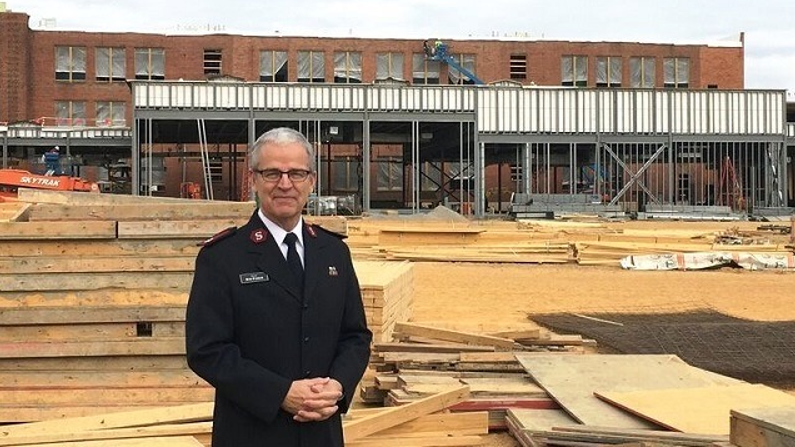
By Protective Life News

This time of year, the Salvation Army bell ringers have gone home and the red kettles have been put away. But the work of the Salvation Army doesn’t stop. The money that goes into the kettles and donations throughout the year provide a vital safety net for individuals and communities in crisis.
“Every minute of every day, someone is being helped by the Salvation Army,” says Maj. Bob Parker, Birmingham Salvation Army commander. “We’re there to meet human need in time of crisis — to help men, women and children.”
He says that though people know the Salvation Army name, and visible holiday campaigns like the red kettle and Angel Tree projects, they don’t know the extent of available services.
It is vast. In existence in Birmingham since 1899, the Salvation Army (itself a religious organization) operates three churches and outreach centers, offering services as bridge support for everything from people struggling to pay a utility bill to helping communities ravaged by disasters.
Its shelter on 11th Avenue North is the only one in town that serves men, women and children in one location, caring for families for up to a year as they get on their feet. In addition to transitional housing, the Salvation Army provides supportive services, from education to child care. It also provides support for adult men recovering from drug and alcohol addiction.
“Oftentimes, these are folks who never thought they’d be at the Salvation Army and in need of help, but it’s a more common story than you think,” Parker says. Each day the shelter serves hot, nutritious lunches to those in need, and houses up to 200 people each night.
New campus
Later this year the organization will be able to serve more residents and expand its program. A new 4.1-acre Salvation Army campus off Finley Avenue is under construction at the site of the former Lewis Elementary School.
“We often say that our current building is being held together with prayer and duct tape,” Parker says.
The Salvation Army has raised $15 million of its $25 million capital campaign goal to renovate the 50,000-square-foot building and adjacent properties, including the historical Slossfield Community Center. Called the Center of Hope, the campus will help the organization continue its long-standing mission of helping people in need in a more modern and comprehensive way.
“When our current building was constructed in the 1960s, it was built to house people dormitory-style, which was current for the time,” Parker says. Back then, clients stayed for a night or two. But now the rooms hold two or three families who are staying as long as a year, sharing a small space and one restroom. “The new buildings focus on giving clients more dignity, including each family having their own apartment and restroom, and will allow more families to be served — up to 260 at a time.”
Job training
Just as exciting, Parker says, is the expanded educational programs the Salvation Army will be able to offer at the new campus. The Education and Workforce Development Center, made possible through a gift from Protective Life, will provide robust educational opportunities for clients.
“Regardless of what education level someone is when they enter our program, we will help them get to the next level,” Parker says. For some, that will be finishing a GED. For others, it will be getting vocational training or an associate degree. Partnering with existing organizations, from Jefferson State Community College to Go Build Alabama, the Salvation Army will bring in teachers to provide educational and job training, and work on activities such as résumé-building and job interview skills.
Securing employment is a pivotal part of clients moving from transitional to permanent housing, Parker says. The Workforce and Education Development Center removes clients’ barriers to access, including fears of going to an unfamiliar campus.
“A lot of folks have a fear of failure when they are going back to school. This takes away that fear, since they’ll be at a campus they are familiar with,” Parker says.
He says the educational opportunities the Salvation Army will offer can affect generations to come. “We believe that education is the key to making a long-term difference in the lives of families — we can’t even calculate the generational impact of this center.”
Support is crucial
The Salvation Army will launch the second phase of its capital campaign later this year. However, donations to support day-to-day operations are always needed, Parker says.
“For what we provide, we have a relatively small staff and are always trying to make ends meet,” he says. “We rely on the generosity of organizations like the United Way, as well as individual and corporate donors like Protective Life.”
“They are truly such a giving organization,” says Carl Thigpen, Protective Life executive vice president and chief investment officer. Like many, Thigpen didn’t realize the extent of the services until he joined the Birmingham Salvation Army’s advisory board three years ago. Thigpen has volunteered serving meals, working to sort toys for Angel Tree recipients and ringing the bell in front of a red kettle.
Each year approximately $600,000 is collected in the kettles. It’s a massive undertaking — this year there were 100 kettles throughout Birmingham, operating six days a week, 10 hours a day, for 37 days. The kettles are staffed in part by volunteers like those from Protective and also by hourly workers.
“It’s incredible to see how the Salvation Army uses its donations,” Thigpen says. “And they do an amazing job training volunteers to serve.”
Volunteer opportunities are posted on the website and, like the need for financial donations, opportunities exist year-round.
Parker says the support of the community is crucial for the Salvation Army as it continues to grow and serve clients. “I’m so thankful for everyone who has come before to help us care for others,” he says.




